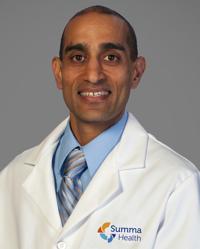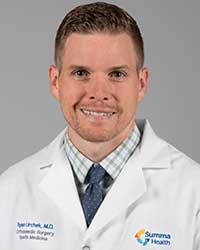Understanding Sports Injuries: When to See a Sports Medicine Physician or Orthopedic Surgeon
Posted September 10, 2025

Whether you are an all-star athlete, weekend warrior or active senior, you are bound to experience a musculoskeletal issue at some point in your life. It may be an acute injury, such as an ankle sprain, muscle strain, fracture, or knee or shoulder trauma, or possibly an overuse injury, like a rotator cuff or other form of tendonitis or stress fracture.
Whatever the condition, it is likely that you will be referred to an orthopedic specialist – either a sports medicine physician or an orthopedic surgeon. While both are devoted to the prevention, diagnosis, and treatment of bone, joint, ligament, tendon and muscle conditions, a sports medicine physician specializes in non-surgical treatments, while an orthopedic surgeon has additional training in surgical care.
Non-Surgical Approaches
Approximately 90% of all sports injuries can be treated non-surgically. Some of the more specialized non-surgical in-office treatments include:
- Ultrasound-guided injections
- Using high-frequency sound waves to produce dynamic and real-time images, an ultrasound-guided injection assists in identifying injuries or abnormalities, as well as performing injections, most commonly involving the hip, shoulder, and knee.
- Diagnostic ultrasounds
- Particularly helpful for acute rotator cuff injuries and certain tendon pathologies, a diagnostic ultrasound allows easier visualization of soft tissues that cannot be seen on x-ray, such as muscles, tendons and ligaments.
- Minimally invasive procedures
- Minimally invasive procedures use smaller surgical incisions that typically result in less pain, no hospital stay and fewer complications than traditional surgery.
Two minimally invasive procedures often used by the Summa Health sports medicine team involve innovative Tenjet® and iovera® technology. The Tenjet system delivers a controlled stream of sterile saline to target the source of chronic tendon pain and help the body regenerate a new, healthy tendon. iovera uses the body’s natural response to cold to treat knee pain and turn off pain receptors at the site. It can be helpful for patients with severe knee osteoarthritis who have been unsuccessful with other nonsurgical treatments, yet are not good surgical candidates. The treatment iovera is beneficial prior to total knee replacement to help with post-operative pain and improve tolerance to post-operative physical therapy.
In addition to treating and preventing injuries, sports medicine physicians often address non-musculoskeletal aspects of orthopedics, like helping athletes maximize their performance; cope with chronic illnesses such as asthma and diabetes; and learn more about nutrition and healthier lifestyles. In fact, sports medicine physicians must undergo extensive additional training related to:
- Concussions and other head injuries
- Nutrition, supplements, ergogenic aids and performance issues
- Customized exercise regimens
- “Return to play” decisions in sick or injured athletes
- Recommendations on safe strength training and conditioning exercises
- Healthy lifestyle education
What’s more, sports medicine physicians guide appropriate referrals to physical and occupational therapies, and, if necessary, expedite referrals to orthopedic surgeons.
Surgical Care
Surprisingly, many of the patients seen by Summa Health sports medicine have injuries or conditions unrelated to sports. In fact, most patients have overuse injuries from work-related duties or other activities, such as meniscus tears, rotator cuff tears and rotator cuff tendinitis.
- Meniscus tears
- A meniscus tear, one of the most common knee injuries, can result from any activity that causes you to forcefully twist or rotate your knee. Kneeling, deep squatting or lifting something heavy – as well as general wear and tear on your knees as you age – can also lead to a torn meniscus. Symptoms include sharp pain, catching/locking, and pain with twisting.
- Rotator cuff tears
- Rotator cuff tears requiring surgery typically result from injuries like falling on your arm, as well as overuse. Symptoms include shoulder pain at night while laying on it, shoulder pain down to the elbow with activity and weakness. While therapy and medications can be an initial option, surgery is often recommended for active patients with acute conditions.
- Rotator cuff tendinitis
- Rotator cuff tendinitis, another common, overuse injury, has symptoms similar to a rotator cuff tear. Therapy, medications and injections are usually the first line of treatment, yet if they fail, surgery can be an option.
Meniscus tears, rotator cuff tears and rotator cuff tendinitis surgeries are typically minimally invasive arthroscopic procedures that use small incisions. With minimally invasive surgery, patients frequently experience less pain, as well quicker rehabilitation and recovery. They ultimately heal and get back to the activities they enjoy faster.
Are you experiencing pain or discomfort in your muscles, bones, ligaments, nerves, joints, tendons or connective tissues? To learn more about Summa Health Orthopedic Sports Medicine or to schedule an appointment, call 877.835.3122 or visit summahealth.org/ortho today.
Vitality eNews Sign Up
Receive the Summa Health eNewsletter for the latest health tips, advice and updates.



